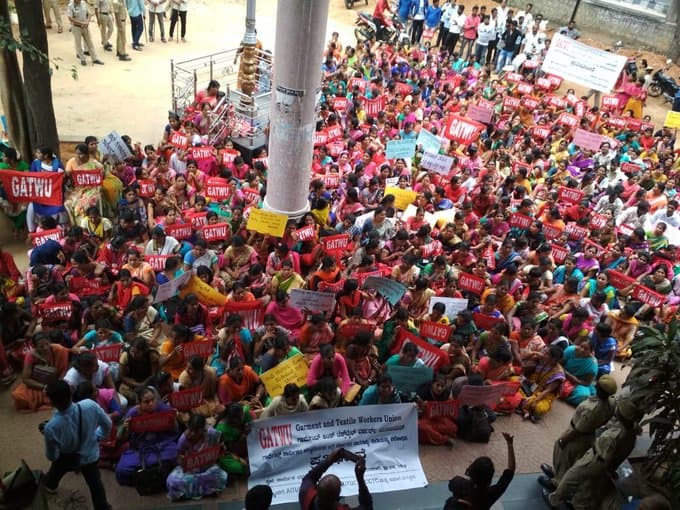The Garments and Textile Workers Union (GATWU) staged a protest on 12th September, to oppose the apathetic attitude of the government and the factory owners. The protest, held in front of the Labour Department office at Dairy Circle, highlighted the inordinate delay in the fixing of minimum wages in the garment industry. It also pointed to the discrimination towards garment workers by the minimum wages committee, which had recommended extremely low wages.
The Karnataka garments industry employs 3.5-4 lakh workers, and 85 percent of the workforce is female. These workers manufacture textiles for international brands and export them, earning substantial foreign exchange for the country.
The female labour force coming to lakhs, who are under the care of the government, receive only minimum wages. Hence the minimum wages fixed by the government are very important for these labourers. Though minimum wages have to be revised every 3-5 years, they have remained stagnant even after six years.
Due to the indifference by government and the lobbying of factory owners, garment workers even today earn only Rs 7000-8000 per month. The female workers who use their income to meet household needs are unable to do so, and are driven to skip at least one meal per day.

GATWU’s protest in front of the Labour Department. Pic: Vinay Sreenivasa
Why are garment workers protesting?
For 73 out of the 82 scheduled employment categories in Karnataka, the government had fixed scientifically-calculated minimum wage of Rs 11,557. In February 2018, the government had issued an order, establishing the same wages for garment workers. However, the government retracted its order within a month, in March 2018, heeding to the factory owners and bureaucrats.
A case was filed in the Karnataka High Court, which in March 2019 ordered to fix minimum wages within six months. But even after the mandated time, the government has not fixed these wages. This needs to be done, just the way government had fixed wages for the 73 industries.
The garment factory owners have explicitly refused the wage demand of unions. The owners say they would increase a mere nine percent of the current wages. In that case, workers’ wages would amount to only Rs 350 per day, rather than Rs 478 that they had demanded initially (which would take monthly wages to Rs 11,557). Condemnably, government representatives on the minimum wages committee too have sided with the owners. Currently, in Karnataka, all workers except garment workers have monthly income of Rs 11,557.
In 2019, when the central government amended the PF Act, the garment workers who were directly affected by this took to the streets in protest and were successful in scrapping it. Minimum wages are a question of livelihood for the garment workers and there is widespread anxiety in this regard.
At the protest, GATWU’s K R Jayaram said the protest was symbolic, and if the government failed to meet their demand, they would intensify protests. AIUTUC’s Y Shanmugam and GATWU president R Prathibha accused the government of gender discrimination, and said since 85 percent of the textile workers were women, the government was of the opinion that lower wages would not affect the workers’ families.
Srirangapattina’s Gokuldas Enterprises’ workers Nagamma and Padma said if the government failed to listen to their pleas, they would intensify the protest and block the Mysuru-Bengaluru road indefinitely. They also threatened violent protests in the near future. INTUC’s Shyamanna Reddy, ALF’s Vinay Srinivas, AICCTU’s Appanna and KGWU’s Sebastian Devraj addressed the protesters. The organisations in solidarity with GATWU are AITUC, CITU, INTUC, AIUTUC, and AICCTU.
[This article is based on a press release from the Garments and Textile Workers Union (GATWU), and has been published here with minimal edits]